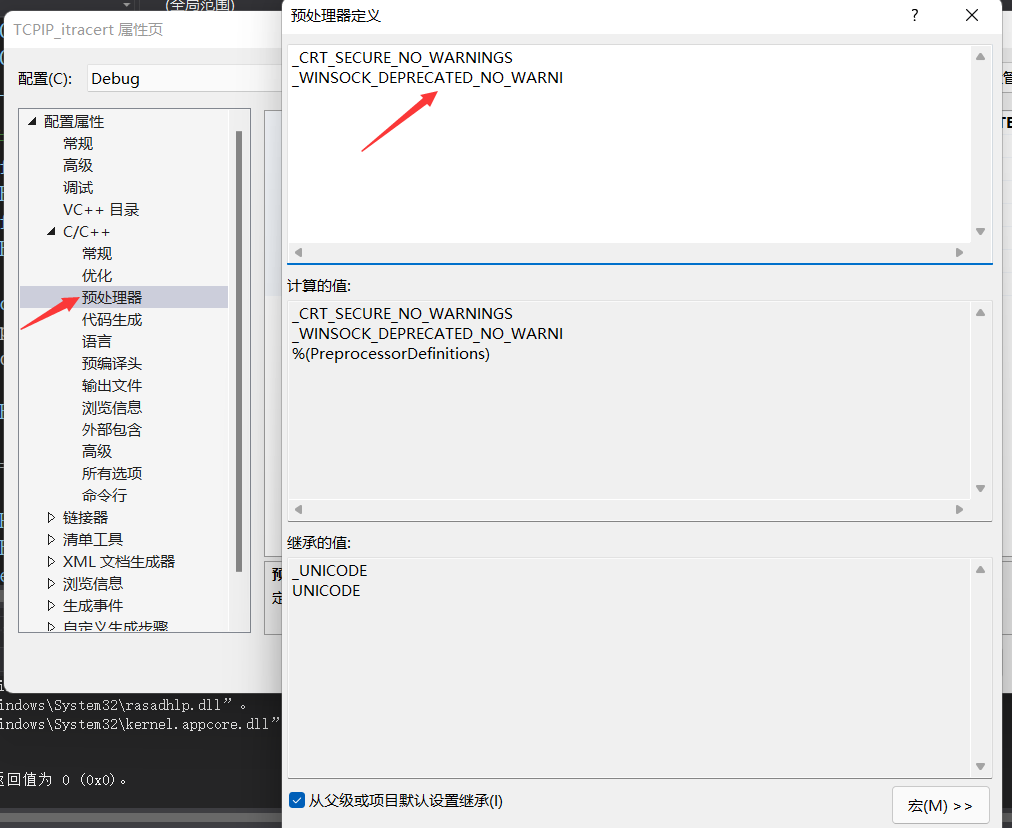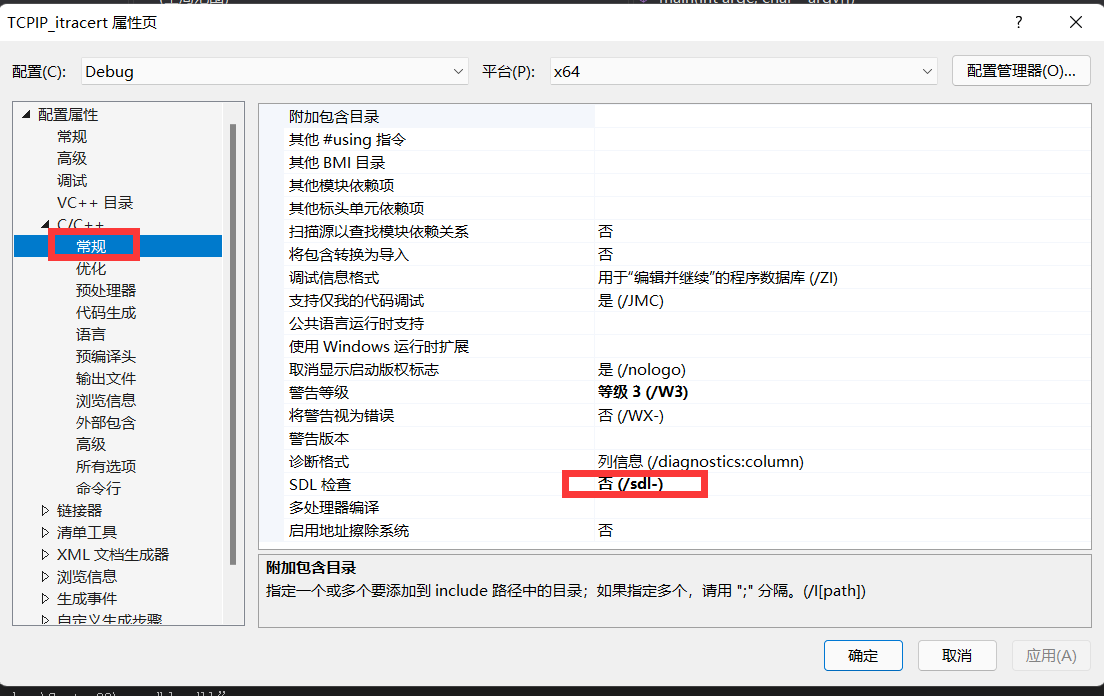网络编程与协议分析 ping程序的实现
#include<stdio.h>
#include<Winsock2.h>
#include<ws2tcpip.h>
#include<stdlib.h>
#include<malloc.h>
#include<string.h>
#include <cstddef>
#include <iostream>
#pragma comment(lib, "ws2_32.lib")
#define ICMP_ECHO_REQUEST 8 //定义回显请求类型
#define DEF_ICMP_DATA_SIZE 20 //定义发送数据长度
#define DEF_ICMP_PACK_SIZE 32 //定义数据包长度
#define MAX_ICMP_PACKET_SIZE 1024 //定义最大数据包长度
#define DEF_ICMP_TIMEOUT 3000 //定义超时为3秒
#define ICMP_TIMEOUT 11 //ICMP超时报文
#define ICMP_ECHO_REPLY 0 //定义回显应答类型
using namespace std;
/*
*IP报头结构
*/
typedef struct
{
byte h_len_ver; //IP版本号
byte tos; // 服务类型
unsigned short total_len; //IP包总长度
unsigned short ident; // 标识
unsigned short frag_and_flags; //标志位
byte ttl; //生存时间
byte proto; //协议
unsigned short cksum; //IP首部校验和
unsigned long sourceIP; //源IP地址
unsigned long destIP; //目的IP地址
} IP_HEADER;
/*
*定义ICMP数据类型
*/
typedef struct _ICMP_HEADER
{
byte type; //类型-----8
byte code; //代码-----8
unsigned short cksum; //校验和------16
unsigned short id; //标识符-------16
unsigned short seq; //序列号------16
unsigned int choose; //选项-------32
} ICMP_HEADER;
typedef struct
{
int usSeqNo; //记录序列号
DWORD dwRoundTripTime; //记录当前时间
byte ttl; //生存时间
in_addr dwIPaddr; //源IP地址
} DECODE_RESULT;
/*
*产生网际校验和
*/
unsigned short GenerateChecksum(unsigned short* pBuf, int iSize)
{
unsigned long cksum = 0; //开始时将网际校验和初始化为0
while (iSize > 1)
{
cksum += *pBuf++; //将待校验的数据每16位逐位相加保存在cksum中
iSize -= sizeof(unsigned short); //每16位加完则将带校验数据量减去16
}
//如果待校验的数据为奇数,则循环完之后需将最后一个字节的内容与之前结果相加
if (iSize)
{
cksum += *(unsigned char*)pBuf;
}
//之前的结果产生了进位,需要把进位也加入最后的结果中
cksum = (cksum >> 16) + (cksum & 0xffff);
cksum += (cksum >> 16);
return (unsigned short)(~cksum);
}
/*
*对ping应答信息进行解析
*/
boolean DecodeIcmpResponse_Ping(char* pBuf, int iPacketSize, DECODE_RESULT* stDecodeResult)
{
IP_HEADER* pIpHrd = (IP_HEADER*)pBuf;
int iIphedLen = 20;
if (iPacketSize < (int)(iIphedLen + sizeof(ICMP_HEADER)))
{
printf("size error! \n");
return 0;
}
//指针指向ICMP报文的首地址
ICMP_HEADER* pIcmpHrd = (ICMP_HEADER*)(pBuf + iIphedLen);
unsigned short usID, usSeqNo;
//获得的数据包的type字段为ICMP_ECHO_REPLY,即收到一个回显应答ICMP报文
if (pIcmpHrd->type == ICMP_ECHO_REPLY)
{
usID = pIcmpHrd->id;
//接收到的是网络字节顺序的seq字段信息 , 需转化为主机字节顺序
usSeqNo = ntohs(pIcmpHrd->seq);
}
if (usID != GetCurrentProcessId() || usSeqNo != stDecodeResult->usSeqNo)
{
printf("usID error!\n");
return 0;
}
//记录对方主机的IP地址以及计算往返的时延RTT
if (pIcmpHrd->type == ICMP_ECHO_REPLY)
{
stDecodeResult->dwIPaddr.s_addr = pIpHrd->sourceIP;
stDecodeResult->ttl = pIpHrd->ttl;
stDecodeResult->dwRoundTripTime = GetTickCount() - stDecodeResult->dwRoundTripTime;
return 1;
}
return 0;
}
void Ping(char* IP)
{
//初始化WinSock
WORD wVersionRequested = MAKEWORD(2, 2);
WSADATA wsaData;
if (WSAStartup(wVersionRequested, &wsaData) != 0)
{
printf("初始化WinSock失败!\n");
return;
}
unsigned long ulDestIP = inet_addr(IP); //将IP地址转化为长整形
if (ulDestIP == INADDR_NONE)
{
//转化不成功时按域名解析
HOSTENT* pHostent = gethostbyname(IP);
if (!pHostent) {
printf("地址解析失败!\n");
return;
}
else
{
ulDestIP = (*(IN_ADDR*)pHostent->h_addr).s_addr; //将HOSTENT转化为长整形
}
}
//填充目的Socket地址
SOCKADDR_IN destSockAddr; //定义目的地址
ZeroMemory(&destSockAddr, sizeof(SOCKADDR_IN)); //将目的地址清空
destSockAddr.sin_family = AF_INET;
destSockAddr.sin_addr.s_addr = ulDestIP;
destSockAddr.sin_port = htons(0);
//使用ICMP协议创建Raw Socket
SOCKET sockRaw = WSASocket(AF_INET, SOCK_RAW, IPPROTO_ICMP, NULL, 0, WSA_FLAG_OVERLAPPED);
if (sockRaw == INVALID_SOCKET)
{
printf("创建Socket失败 !\n");
return;
}
//设置端口属性
int iTimeout = DEF_ICMP_TIMEOUT;
if (setsockopt(sockRaw, SOL_SOCKET, SO_RCVTIMEO, (char*)&iTimeout, sizeof(iTimeout)) == SOCKET_ERROR)
{
printf("设置参数失败!\n");
return;
}
if (setsockopt(sockRaw, SOL_SOCKET, SO_SNDTIMEO, (char*)&iTimeout, sizeof(iTimeout)) == SOCKET_ERROR)
{
printf("设置参数失败!\n");
return;
}
//定义发送的数据段
char IcmpSendBuf[DEF_ICMP_PACK_SIZE];
//填充ICMP数据包个各字段
ICMP_HEADER* pIcmpHeader = (ICMP_HEADER*)IcmpSendBuf;
pIcmpHeader->type = ICMP_ECHO_REQUEST;
pIcmpHeader->code = 0;
pIcmpHeader->id = (unsigned short)GetCurrentProcessId();
memset(IcmpSendBuf + sizeof(ICMP_HEADER), 'E', DEF_ICMP_DATA_SIZE);
//循环发送四个请求回显icmp数据包
int usSeqNo = 0;
DECODE_RESULT stDecodeResult;
while (usSeqNo <= 3)
{
pIcmpHeader->seq = htons(usSeqNo);
pIcmpHeader->cksum = 0;
pIcmpHeader->cksum = GenerateChecksum((unsigned short*)IcmpSendBuf, DEF_ICMP_PACK_SIZE); //生成校验位
//记录序列号和当前时间
stDecodeResult.usSeqNo = usSeqNo;
stDecodeResult.dwRoundTripTime = GetTickCount();
//发送ICMP的EchoRequest数据包
if (sendto(sockRaw, IcmpSendBuf, DEF_ICMP_PACK_SIZE, 0, (SOCKADDR*)&destSockAddr, sizeof(destSockAddr)) == SOCKET_ERROR)
{
//如果目的主机不可达则直接退出
if (WSAGetLastError() == WSAEHOSTUNREACH)
{
printf("目的主机不可达!\n");
exit(0);
}
}
SOCKADDR_IN from;
int iFromLen = sizeof(from);
int iReadLen;
//定义接收的数据包
char IcmpRecvBuf[MAX_ICMP_PACKET_SIZE];
while (1)
{
iReadLen = recvfrom(sockRaw, IcmpRecvBuf, MAX_ICMP_PACKET_SIZE, 0, (SOCKADDR*)&from, &iFromLen);
if (iReadLen != SOCKET_ERROR)
{
if (DecodeIcmpResponse_Ping(IcmpRecvBuf, sizeof(IcmpRecvBuf), &stDecodeResult))
{
printf("来自 %s 的回复: 字节 = %d 时间 = %dms TTL = %d\n", inet_ntoa(stDecodeResult.dwIPaddr),
iReadLen - 20, stDecodeResult.dwRoundTripTime, stDecodeResult.ttl);
}
break;
}
else if (WSAGetLastError() == WSAETIMEDOUT)
{
printf("time out ! *****\n");
break;
}
else
{
printf("发生未知错误!\n");
break;
}
}
usSeqNo++;
}
//输出屏幕信息
printf("Ping complete...\n");
closesocket(sockRaw);
WSACleanup();
}
int main(int argc, char* argv[])
{
char com[10], IP[20];
while (1) {
printf("command>>");
scanf("%s %s", com, IP);
if (strcmp(com, "ping") == 0)
{
Ping(IP);
}
else
{
printf("command error ! \n");
}
}
return 0;
}
配置如下:





